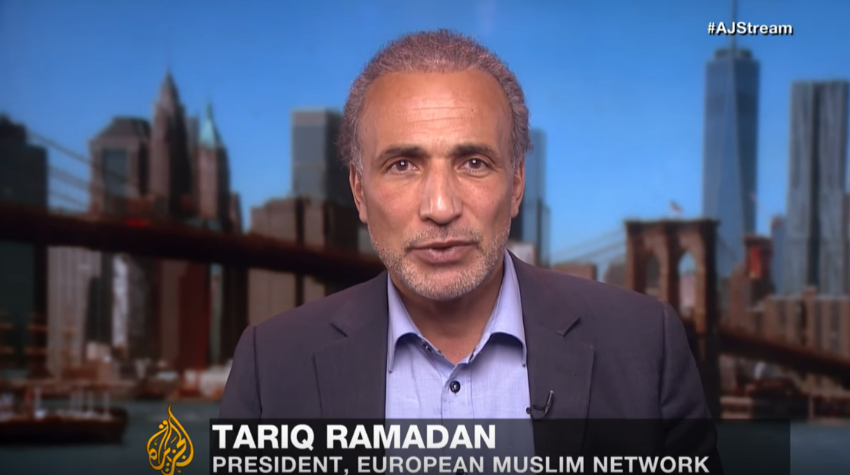Shaykh Hamza Yusuf and Tariq Ramadan’s presence promised much, but these scholars never got down to the nitty-gritty
Can Islam be reformed? What role, if any, should government play in bringing about reform? Shaykh Hamza Yusuf, a charismatic white California-based American who converted to Islam in 1977, and the equally charistmatic Egyptian/Swiss scholar Tariq Ramadan, tip-toed elegantly around the subject on Wednesday night without setting off any of the fire alarms.
They’re certainly a draw: Hamza with his links to the White House – the Muslim with whom presidents like to be seen; and Ramadan whose links with the founder of the Muslim Brotherhood (he is Hassan al-Banna‘s grandson) renders his new Oxford professorship of contemporary Islamic studies très piquant.
They managed to pack out Oxford’s 17th-century Sheldonian Theatre for a suitably hyped event that many were prepared to pay £110 a ticket for – though that included an "exclusive networking reception" at the Divinity School together with a "sumptuous" buffet afterwards. Muslims, male and female, students and elder statesmen, the long-bearded and the sharp-suited were prepared to pay this vast sum to hear credible scholars take on the elephant in the public square: can Islam be reformed while side-stepping the need for innovation (bida) – which is heresy? Can it adapt to the claims of the modern world and remain true to its own authentic inheritance?
Well, the crowd (and writers like Yahya Birt) were to be disappointed. Both men stressed their commitment to the fundamental texts and beliefs of Islam. Both emphasised that the critical issue is knowing how to interpret the texts, the Qur’an in particular, in ways which are faithful but relevant to modern contexts. Yet neither was prepared to give specific example. It was impossible therefore to assess the implications of their ideas, or understand their reasoning. Neither was it possible to guage the significance of this event, given the protagonsists’ failure to address specifics while being deeply complicit in western culture. The debate is already raging among less high-profile Muslim progressives around the globe, so here was nothing new.
Although we held our breath, Tariq Ramadan kept things frustratingly general. Simply repeating his usual line about the need and the possibility of connecting texts with current contexts is not the same as actually telling us how. For example, in traditional Islamic law, if the husband of a Muslim couple decides to leave Islam and apostasise, he must be divorced from his wife, since a Muslim woman married to a non-Muslim man is regarded as unacceptable. A Muslim friend said to me recently that in an otherwise happy marriage, demanding that the couple separate is just inappropriate today. But isn’t this to bend sharia law out of all recognisable shape? Such issues – and hundreds like them – facing modern Muslims are dynamically alive today, and crying out for attention in a public forum like this.
But attention is what they did not get.
Tariq Ramadan stressed that he wants to reform the way Muslims think, not to reform Islam itself. This highlights a crisis of authority that Yusuf himself referred to when he spoke of Sheikh Google and Weekend Muftis dishing out fatwas – legal rulings – without the proper training. Both speakers emphasised how most Muslims are blissfully unaware of the vast riches of the Islamic intellectual tradition: Hamza Yusuf citing Ibn Taymiyya (d 1328) who allowed a woman to lead ritual prayer for a mixed gathering – as long as she did so from the back of the group. But the really interesting question, left unspoken, is how you decide whether to promote this type of unusual view over other more restrictive views on women’s leadership of mixed prayer. Are these so-called "reformist Muslims" serious, or are their blandishments a smoke screen? Who are they really addressing on what, and why?
On some of today’s big issues there were some tantalising nuggets. Don’t get too close to governments: advise them if your intentions are faithful to Islam, but recognise that this may taint you in the eyes of other Muslims.
Hamza Yusuf stated at the very end of his talk that Islam is a peaceful faith, and that Muhammad disdained war. No doubt he has thought-through responses on how this fits with the rapid spread of Islam through conquest in the hundred years after the death of Muhammad. It just would have been good to hear them.
Likewise Tariq Ramadan mentioned that the word "jihad" has nothing to do with holy war. So what are we to do with the more military interpretations of jihad, both classical and modern? Were they always a mistake, or have they just been overtaken by changing circumstances, and become irrelevant?
Hamza Yusuf commented that Muslims lack the intellectual tools to navigate modern situations, even though the tradition itself has all the necessary resources, he says, for reform – or, as he calls it, "renovation".
As the Oxford don might say, in summary of one of those essays to which those eager-eyed students will now be returning: "Some interesting ideas, but more examples and explanation needed."
SOURCE : The Guardian



![PALEXPO : Democratic Engagement & Justice for Palestinians [08/07/2017]](https://tariqramadan.com/english/wp-content/uploads/sites/9/2017/07/Palexpo.png)
![Bristol Festival of Ideas : Conversation with Julian Baggini [24/05/2017]](https://tariqramadan.com/english/wp-content/uploads/sites/9/2017/06/bristol.png)
![Interview on BBC Radio Ulster [06/06/2017]](https://tariqramadan.com/english/wp-content/uploads/sites/9/2017/06/p03nnqlv.jpg)
![Interview on BBC 4 : What do the London attacks have to do with Islam? What is the Muslims’ responsibility?[06/06/2017]](https://tariqramadan.com/english/wp-content/uploads/sites/9/2017/06/bbc.jpg)

